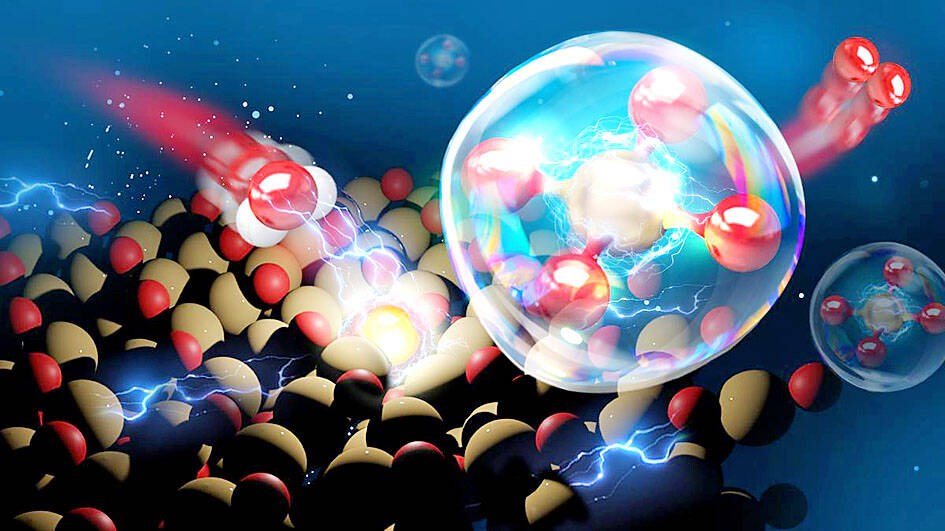Taiwanese researchers have discovered that copper oxide can be used in the production of hydrogen fuel in a finding that could revolutionize the efficiency and cost-effectiveness of hydrogen technology.
The study, published in Nature Communications on Feb. 1, was conducted by Lin Yan-gu (林彥谷) of the National Synchrotron Radiation Research Center in collaboration with researchers from National Yang Ming Chiao Tung University in Taiwan and the Max Planck Institutes in Germany.
Hydrogen energy is one of the technologies being explored as a replacement for fossil fuels as part of the global effort to achieve net zero carbon emissions by 2050 while meeting the world’s energy needs, the center said in a statement yesterday.

Photo courtesy of the National Synchrotron Radiation Research Center
Currently, hydrogen fuel is produced either by extraction from fossil fuels, which is known as “gray hydrogen,” as it still releases carbon into the environment, or by splitting water via electrolysis, which is called “green hydrogen,” as the process is carbon-free.
However, water-splitting technology has not become mainstream, as it requires the use of high-voltage electricity and expensive catalysts, such as platinum and iridium, the center said.
The researchers proved that copper oxide can be utilized as a cheap and effective alternative to current catalysts by injecting hydrogen atoms into a copper oxide catalyst, it said.
The cuprous oxide catalyst enables continuous water splitting for more than 100 hours using low-voltage electricity, which significantly reduces energy consumption, the center said.
The material’s lifetime is 10 times longer than catalysts in use and 10,000 times cheaper than commercial iridium, it said.
The team determined that the greater efficiency of copper oxide stems from a compound within the substance called trivalent copper, which is highly unstable and virtually non-existent in nature, it said.
The researchers used the facilities at the Taiwan Photon Source, the Taiwan Light Source and Taiwanese Beamlines at the SPring-8 synchrotron radiation facility in Japan for the study, the center said.
The project is part of the center’s efforts to develop green technologies to facilitate Taiwan’s bid to become a net zero economy by 2050, it said.

An essay competition jointly organized by a local writing society and a publisher affiliated with the Chinese Communist Party (CCP) might have contravened the Act Governing Relations Between the People of the Taiwan Area and the Mainland Area (臺灣地區與大陸地區人民關係條例), the Mainland Affairs Council (MAC) said on Thursday. “In this case, the partner organization is clearly an agency under the CCP’s Fujian Provincial Committee,” MAC Deputy Minister and spokesperson Liang Wen-chieh (梁文傑) said at a news briefing in Taipei. “It also involves bringing Taiwanese students to China with all-expenses-paid arrangements to attend award ceremonies and camps,” Liang said. Those two “characteristics” are typically sufficient

A magnitude 5.9 earthquake that struck about 33km off the coast of Hualien City was the "main shock" in a series of quakes in the area, with aftershocks expected over the next three days, the Central Weather Administration (CWA) said yesterday. Prior to the magnitude 5.9 quake shaking most of Taiwan at 6:53pm yesterday, six other earthquakes stronger than a magnitude of 4, starting with a magnitude 5.5 quake at 6:09pm, occurred in the area. CWA Seismological Center Director Wu Chien-fu (吳健富) confirmed that the quakes were all part of the same series and that the magnitude 5.5 temblor was

The brilliant blue waters, thick foliage and bucolic atmosphere on this seemingly idyllic archipelago deep in the Pacific Ocean belie the key role it now plays in a titanic geopolitical struggle. Palau is again on the front line as China, and the US and its allies prepare their forces in an intensifying contest for control over the Asia-Pacific region. The democratic nation of just 17,000 people hosts US-controlled airstrips and soon-to-be-completed radar installations that the US military describes as “critical” to monitoring vast swathes of water and airspace. It is also a key piece of the second island chain, a string of

The Central Weather Administration has issued a heat alert for southeastern Taiwan, warning of temperatures as high as 36°C today, while alerting some coastal areas of strong winds later in the day. Kaohsiung’s Neimen District (內門) and Pingtung County’s Neipu Township (內埔) are under an orange heat alert, which warns of temperatures as high as 36°C for three consecutive days, the CWA said, citing southwest winds. The heat would also extend to Tainan’s Nansi (楠西) and Yujing (玉井) districts, as well as Pingtung’s Gaoshu (高樹), Yanpu (鹽埔) and Majia (瑪家) townships, it said, forecasting highs of up to 36°C in those areas